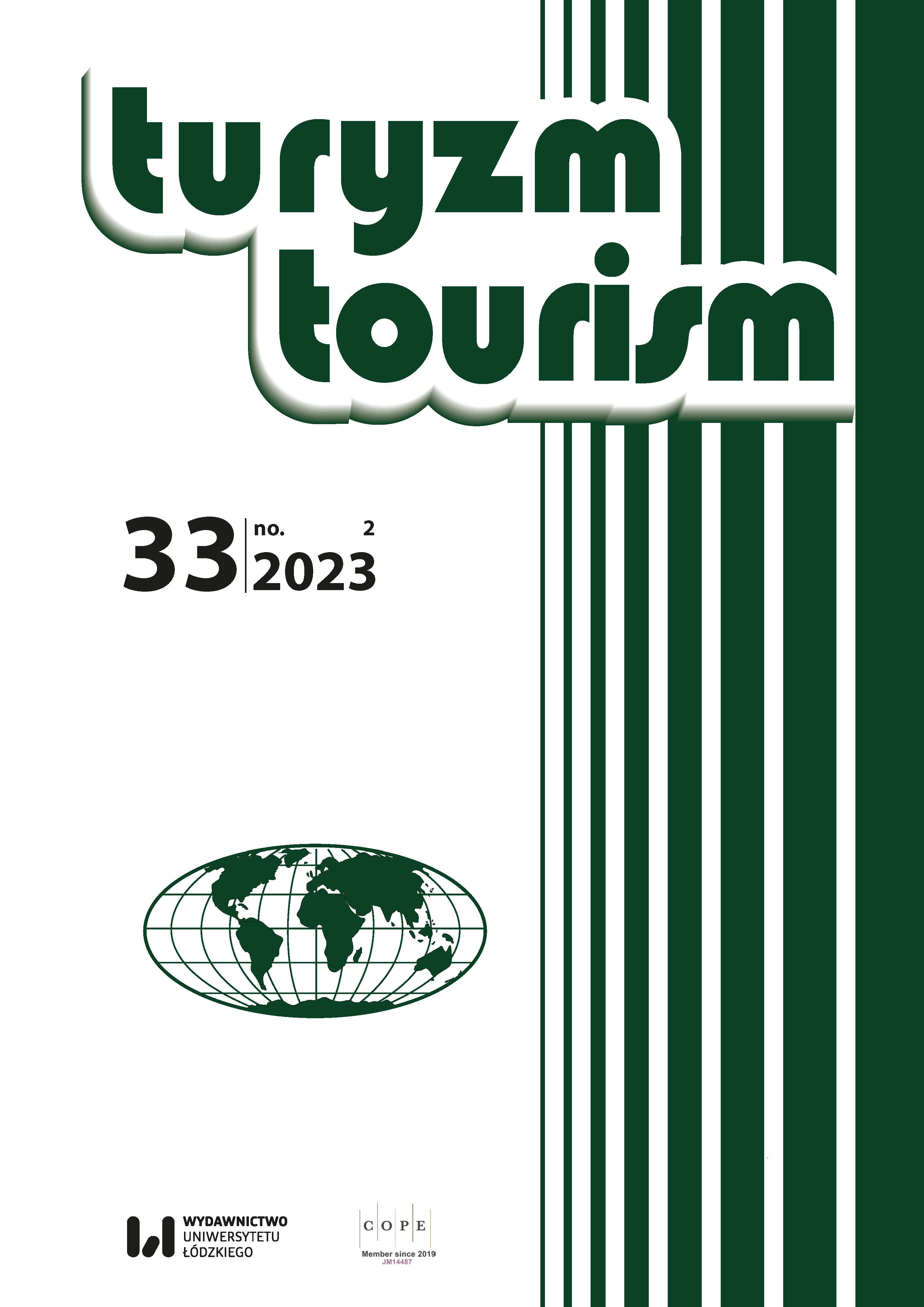Innovation culture as a premise for engaging and memorable tourist experiences through gamification
DOI:
https://doi.org/10.18778/0867-5856.33.2.07Keywords:
innovation, innovation culture, gamification, tourism, BulgariaAbstract
The purpose of the article is to research the impact of innovativeness and innovation culture as premises for effective gamification at destination level. The main hypothesis defended is that innovation culture and gamification can be powerful tools for tourism destination management. By creating a culture that supports innovation and implementing gamification strategies, tourism destinations can enhance their competitiveness, attract more tourists and improve the overall tourism experience. Bulgaria has been selected as the tourism destination for analysis. The methodology combines desk research with key informant surveys. The first survey is about innovativeness and innovation culture and the second is about destination gamification. Both include 18 informants, representing the travel and hospitality sectors in Bulgaria. The main findings are that innovation culture and gamification can be powerful tools for tourism destination management. The contribution is a first attempt to link innovation culture with destination management and the use of gamification as a tool for memorable tourist experiences. The article contains data and gives practical insights reflecting the Bulgarian perspective in the field.
Downloads
References
Abou-Shouk, M., & Soliman, M. (2021). The impact of gamification adoption intention on brand awareness and loyalty in tourism: The mediating effect of customer engagement. Journal of Destination Marketing & Management, 20, Article 100559. https://doi.org/10.1016/j.jdmm.2021.100559
Google Scholar
DOI: https://doi.org/10.1016/j.jdmm.2021.100559
Adner, R., & Kapoor, R. (2010). Value creation in innovation ecosystems: How the structure of technological interdependence affects firm performance in new technology generations. Strategic Management Journal, 31(3), 306–333. https://doi.org/10.1002/smj.821
Google Scholar
DOI: https://doi.org/10.1002/smj.821
Aimsterdam. (n.d.). https://www.aimsterdam.nl/
Google Scholar
Ateljevic, I., & Doorne, S. (2000). ‘Staying within the fence’: Lifestyle entrepreneurship in tourism. Journal of Sustainable Tourism, 8(5), 378–392. https://doi.org/10.1080/09669580008667374
Google Scholar
DOI: https://doi.org/10.1080/09669580008667374
Autio, E., & Thomas, L.D.W. (2014). Innovation ecosystems: Implications for innovation management. In D.G.M. Dodgson, D.M. Gann, & N. Phillips (Eds.), The Oxford handbook of innovation management (pp. 204–228). Oxford University Press.
Google Scholar
Baggio, R., & Del Chiappa, G. (2014). Real and virtual relationships in tourism digital ecosystems. Information Technology & Tourism, 14, 3–19. https://doi.org/10.1007/s40558-013-0001-5
Google Scholar
DOI: https://doi.org/10.1007/s40558-013-0001-5
Bravo, R., Catalán, S., & Pina, J.M. (2021). Gamification in tourism and hospitality review platforms: How to R.A.M.P. up users’ motivation to create content. International Journal of Hospitality Management, 99, Article 103064. https://doi.org/10.1016/j.ijhm.2021.103064
Google Scholar
DOI: https://doi.org/10.1016/j.ijhm.2021.103064
Buhalis, D., Costa, C., & Ford, F. (2005). Tourism business frontiers: Consumers, products and industry. Butterworth-Heinemann. https://doi.org/10.4324/9780080455914
Google Scholar
DOI: https://doi.org/10.4324/9780080455914
Calof, J.L., & Beamish, P.W. (1995). Adapting to foreign markets: Explaining internationalization. International Business Review, 4(2), 115–131. https://doi.org/10.1016/0969-5931(95)00001-G
Google Scholar
DOI: https://doi.org/10.1016/0969-5931(95)00001-G
Chen, W.-J. (2011). Innovation in hotel services: Culture and personality. International Journal of Hospitality Managment, 30(1), 64–72. https://doi.org/10.1016/j.ijhm.2010.07.006
Google Scholar
DOI: https://doi.org/10.1016/j.ijhm.2010.07.006
Chetty, S., & Campbell-Hunt, C. (2004). A strategic approach to internationalization: A traditional versus a ‘‘born-global’’ approach. Journal of International Marketing, 12(1), 57–81. https://doi.org/10.1509/jimk.12.1.57.25651
Google Scholar
DOI: https://doi.org/10.1509/jimk.12.1.57.25651
Corrêa, C., & Kitano, C. (2015). Gamification in tourism: Analysis of Brazil Quest game. ENTER 2015: Vol. 6: Short Papers. https://ertr.tamu.edu/files/2015/02/SP05_MobileSession_Correa.pdf
Google Scholar
Deterding, S., Dixon, D., Khaled, R., & Nacke, L. (2011). From game design elements to gamefulness: Defining “gamification”. In A. Lugmayr, H. Franssila, C. Safran, & I. Hammouda (Eds.), MindTrek Tampere, Fionland 2011: Proceedings of the 15th International Academic MindTrek Conference: Envisioning Future Media Environment (pp. 9–15). Association for Computing Machinery. https://doi.org/10.1145/2181037.2181040
Google Scholar
DOI: https://doi.org/10.1145/2181037.2181040
Dobni, C.B. (2008). Measuring innovation culture in organizations: The development of a generalized innovation culture construct using exploratory factor analysis. European Journal of Innovation Management, 11(4), 539–559. https://doi.org/10.1108/14601060810911156
Google Scholar
DOI: https://doi.org/10.1108/14601060810911156
Dubai Future Foundation. (n.d.). https://www.dubaifuture.ae/European Commission, Directorate-General for Research and Innovation. (2022). European innovation scoreboard 2022: Executive summary (p. 49). Publications Office of the European Union. https://data.europa.eu/doi/10.2777/563149
Google Scholar
European Commission, Representation in Bulgaria. (2020). Innovation.bg 2019: Innovation and economic growth. Publications Office of the European Union. https://op.europa.eu/en/publication-detail/-/publication/8571f99c-3d92-11ea-ba6e-01aa75ed71a1
Google Scholar
European Commission. (n.d.). https://commission.europa.eu/index_en
Google Scholar
Gomes, L.A.V., Facin, A.L.F., Salerno, M.S., & Ikenami, R.K. (2018). Unpacking the innovation ecosystem construct: Evolution, gaps and trends. Technological Forecasting & Social Change, 136, 30–48. https://doi.org/10.1016/j.techfore.2016.11.009
Google Scholar
DOI: https://doi.org/10.1016/j.techfore.2016.11.009
Gomezelj, D. (2016). A systematic review of research on innovation in hospitality and tourism. International Journal of Contemporary Hospitality Management, 28(3), 516–558. https://doi.org/10.1108/IJCHM-10-2014-0510
Google Scholar
DOI: https://doi.org/10.1108/IJCHM-10-2014-0510
Hjalager, A.-M. (2010). A review of innovation research in tourism. Tourism Managment, 31(1), 1–12. https://doi.org/10.1016/j.tourman.2009.08.012
Google Scholar
DOI: https://doi.org/10.1016/j.tourman.2009.08.012
Hjalager, A.-M. (2015). 100 innovations that transformed tourism. Journal of Travel Research, 54(1), 3–21. https://doi.org/10.1177/0047287513516390
Google Scholar
DOI: https://doi.org/10.1177/0047287513516390
Hofacker, C.F., de Ruyter, K., Lurie, N.H., Manchanda, P., & Donaldson, J. (2016). Gamification and mobile marketing effectiveness. Journal of Interactive Marketing, 34(1), 25–36. https://doi.org/10.1016/j.intmar.2016.03.001
Google Scholar
DOI: https://doi.org/10.1016/j.intmar.2016.03.001
Hsiao, C.-H., & Tang, K.-Y. (2021). Who captures whom – Pokémon or tourists? A perspective of the stimulus-organism-response model. International Journal of Information Management, 61, Article 102312. https://doi.org/10.1016/j.ijinfomgt.2021.102312
Google Scholar
DOI: https://doi.org/10.1016/j.ijinfomgt.2021.102312
Innovation Norway. (n.d.). https://www.innovasjonnorge.no
Google Scholar
Ivars-Baidal, J.A., Celdrán-Bernabeu, MA., Mazón, J.-N., & Perles-Ivars, Á.F. (2019). Smart destinations and the evolution of ICTs: A new scenario for destination management? Current Issues in Tourism, 22(13), 1581–1600. https://doi.org/10.1080/13683500.2017.1388771
Google Scholar
DOI: https://doi.org/10.1080/13683500.2017.1388771
Jacob, M., Florido, C., & Aguiló, E. (2010). Research note: Environmental innovation as a competitiveness factor in the Balearic Islands. Tourism Economics, 16(3), 755–764. https://doi.org/10.5367/000000010792278365
Google Scholar
DOI: https://doi.org/10.5367/000000010792278365
Johanson, J., & Mattsson, L.-G. (1988). Strategies in global competition. In H. Hood, & J. Vahlne (Eds.), Internationalization in industrial systems: A network approach (pp. 287–314). Croom-Helm.
Google Scholar
Johanson, J., & Vahlne, J.-E. (1977). The internationalization process of the firm: A model of knowledge development and increasing foreign market commitments. Journal of International Business Studies, 8, 23–32. https://doi.org/10.1057/palgrave.jibs.8490676
Google Scholar
DOI: https://doi.org/10.1057/palgrave.jibs.8490676
Knowles, T., Diamantis, D., & El-Mourhabi, J.B. (2001). The globalization of tourism and hospitality: A strategic perspective. Continuum.
Google Scholar
Mileva, S., Assenova, M., Petrov, E., & Gyaurova, V. (2021). The potential of location-based gamification apps for promoting Sofia as a tourist destination. Turyzm/Tourism, 31(1), 21–27. https://doi.org/10.18778/0867-5856.31.1.13
Google Scholar
DOI: https://doi.org/10.18778/0867-5856.31.1.13
Moore, J. (1993, May–June). Predators and prey: A new ecology of competition. Harvard Business Review, 71(3), 75–86.
Google Scholar
Negruşa, A.L., Toader, V., Sofică, A., Tutunea, M.F., & Rus, R.V. (2015). Exploring gamification techniques and applications for sustainable tourism. Sustainability, 7(8), 11160–11189. https://doi.org/10.3390/su70811160
Google Scholar
DOI: https://doi.org/10.3390/su70811160
Organisation for Economic Co-operation and Development, & Statistical Office of the European Communities. (2005). Oslo manual: Guidelines for collecting and interpreting innovation data (3rd ed.). OECD Publishing. https://doi.org/10.1787/9789264013100-en
Google Scholar
DOI: https://doi.org/10.1787/9789264013100-en
Paget, E., Dimanche, F., & Mounet, J.-P. (2010). A tourism innovation case: An actor-network approach. Annals of Tourism Research, 37(3), 828–847. https://doi.org/10.1016/j.annals.2010.02.004
Google Scholar
DOI: https://doi.org/10.1016/j.annals.2010.02.004
Pasca, M.G., Renzi, M.F., Di Pietro, L., & Guglielmetti Mugion, R. (2021). Gamification in tourism and hospitality research in the era of digital platforms: A systematic literature review. Journal of Service Theory and Practice, 31(5), 691–737. https://doi.org/10.1108/JSTP-05-2020-0094
Google Scholar
DOI: https://doi.org/10.1108/JSTP-05-2020-0094
Republic of Bulgaria. Ministry of Innovation and Growth. (n.d.). https://www.mig.government.bg/?lang=en
Google Scholar
Rønningen, M. (2010). Innovation in the Norwegian rural tourism industry: Results from a Norwegian survey. The Open Social Science Journal, 3, 15–29. https://doi.org/10.2174/1874945301003010015
Google Scholar
DOI: https://doi.org/10.2174/1874945301003010015
Sever, N.S., Sever, G.N., & Kuhzady, S. (2015). The evaluation of potentials of gamification in tourism marketing communication. International Journal of Academic Research in Business and Social Sciences, 5(10), 188–202. https://doi.org/10.6007/IJARBSS/v5-i10/1867
Google Scholar
DOI: https://doi.org/10.6007/IJARBSS/v5-i10/1867
Sofia Municipality. (n.d.). https://www.sofia.bg/en/web/sofia-municipality/
Google Scholar
Swacha, J., & Ittermann, R. (2017). Enhancing the tourist attraction visiting process with gamification: Key concepts. Engineering Management in Production and Service, 9(4), 59–66. https://doi.org/10.1515/emj-2017-0031
Google Scholar
DOI: https://doi.org/10.1515/emj-2017-0031
Tourism New Zealand. (n.d.). https://www.tourismnewzealand.com/VisitOSLO. (n.d.). https://www.visitoslo.com/en/
Google Scholar
Weidenfeld, A., Williams, A.M., & Butler, R.W. (2010). Knowledge transfer and innovation among attractions. Annals of Tourism Research, 37(3), 604–626. https://doi.org/10.1016/j.annals.2009.12.001
Google Scholar
DOI: https://doi.org/10.1016/j.annals.2009.12.001
Wu, L., & Stilwell, M.A. (2018). Exploring the marketing potential of location-based mobile games. Journal of Research in Interactive Marketing, 12(1), 22–44. https://doi.org/10.1108/JRIM-06-2017-0041
Google Scholar
DOI: https://doi.org/10.1108/JRIM-06-2017-0041
Xu, F., Buhalis, D., & Weber, J. (2017). Serious games and gamification of tourism. Tourism Managment, 60, 244–256. https://doi.org/10.1016/j.tourman.2016.11.020
Google Scholar
DOI: https://doi.org/10.1016/j.tourman.2016.11.020
Xu, F., Weber, J., & Buhalis, D. (2014). Gamification in tourism. In Z. Xiang, & I. Tussyadiah (Eds.), Information and Communication Technologies in Tourism 2014: Proceedings of the International Conference in Dublin, Ireland, January 21–24, 2014 (pp. 525–537). Springer. https://doi.org/10.1007/978-3-319-03973-2_38
Google Scholar
DOI: https://doi.org/10.1007/978-3-319-03973-2_38
Yang, Y., Asaad, Y., & Dwivedi, Y. (2017). Examining the impact of gamification on intention of engagement and brand attitude in the marketing context. Computers in Human Behavior, 73, 459–469. https://doi.org/10.1016/j.chb.2017.03.066
Google Scholar
DOI: https://doi.org/10.1016/j.chb.2017.03.066
Downloads
Published
How to Cite
Issue
Section
License

This work is licensed under a Creative Commons Attribution-NonCommercial-NoDerivatives 4.0 International License.










